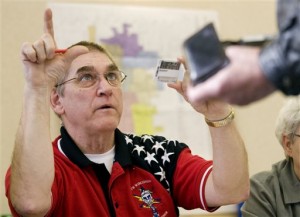Voter ID ruling creating confusion for primary
By: Associated Press//August 11, 2014//
By SCOTT BAUER
Associated Press

MADISON, Wis. (AP) — Voters will not have to show photo identification to cast a ballot in Tuesday’s primary election, but poll watchers say they’re still concerned there could be confusion thanks to a recent state Supreme Court ruling that the photo ID law is constitutional.
The court’s decision didn’t reinstate the law because the photo ID requirement was previously blocked in federal court. Republican Attorney General J.B. Van Hollen is trying to get that ruling put on hold in time for the November general election.
The opposing legal views create confusion, especially for voters who aren’t paying close attention or may be misinformed, said Larry Dupuis, attorney for the American Civil Liberties Union in Wisconsin. The biggest concern is that someone without an ID may assume they can’t vote, so they won’t show up, Dupuis said.
“There’s certainly some potential for confusion,” he said. “There’s always some risk because if people only see a headline or the beginning of a TV news report and the takeaway is it’s been upheld, there’s a risk people won’t look beyond that. And there’s also the rumor mill.”
The ACLU represented individuals who challenged the photo ID requirement in the federal lawsuit, which was blocked and called unconstitutional. Dupuis said even one of the ACLU’s clients was confused about the status of the law after hearing about the state Supreme Court upholding the law on July 31 — 12 days before the primary.
“Unfortunately, not everyone can pick up their phone and call an attorney to straighten it out,” Dupuis said.
The state’s chief elections official, Kevin Kennedy, deflected concerns, saying he wasn’t worried about voters not coming to the polls out of confusion. Many voters who don’t know the status of the law come prepared with a photo ID just in case, he said.
“I don’t see someone saying, ‘Gee, I don’t know if I need photo ID, I’m going to stay away from the polls,'” Kennedy said. “It’s going to be a low turnout to begin with. People who turn out this election are going to be people who pay a lot of attention to the process.”
Local election clerks, the state elections board and The League of Women Voters of Wisconsin are all sending out information in advance of the primary to let voters know they don’t need a photo ID.
The high court’s ruling creates more confusion because groups haven’t had time to educate voters that the law remains blocked, said Andrea Kaminski, the executive director of The League of Women Voters of Wisconsin, which also filed a lawsuit challenging the requirement.
Milwaukee County Clerk Joseph Czarnezki said he’s heard questions in the community about whether photo IDs will be required, but his office has not been getting calls with questions. It’s less of a concern before a primary election because the people who will vote Tuesday are generally more knowledgeable “hardcore” voters than those who show up for the general election, he said.
Marathon County Clerk Nan Kottke also said she’s not worried about confusion.
“Photo ID is not required,” she said. “I don’t expect any problems.”
Kennedy predicts turnout will be about 15 percent. The biggest statewide race on the ballot is the three-way contest on the Democratic side for attorney general. There are several hot local races, most notably the four-way Republican contest for the open 6th Congressional District seat.
There is also a Democratic primary for governor, although based on polls, fundraising, endorsements and organization, former Trek executive Mary Burke is widely considered the front-runner against longshot candidate state Rep. Brett Hulsey. There are also statewide primaries for lieutenant governor, state treasurer and secretary of state.
Five of the eight congressional districts have primary races, as well as five of the 17 state Senate districts and 26 of the 99 Assembly districts. Follow @sbauerAP
Legal News
- History made in Trump New York trial opening statements
- Prosecutor won’t bring charges against Wisconsin lawmaker over fundraising scheme
- Republican Wisconsin Senate candidate says he doesn’t oppose elderly people voting
- Vice President Harris to reveal final rules mandating minimum standards for nursing home staffing
- Election workers fear threats to their safety as November nears
- Former law enforcement praise state’s response brief in Steven Avery case
- Eric Toney announces re-election bid for Fond du Lac County District Attorney
- Former Wisconsin Democratic Rep. Peter Barca announces new bid for Congress
- Republicans file lawsuit challenging Evers’s partial vetoes to literacy bill
- More human remains believed those of missing woman wash up on Milwaukee Co. beach
- Vice President Harris returning to Wisconsin for third visit this year
- Wisconsin joins Feds, dozens of states to hold airlines accountable for bad behavior
WLJ People
- Power 30 Personal Injury Attorneys – Russell Nicolet
- Power 30 Personal Injury Attorneys – Benjamin Nicolet
- Power 30 Personal Injury Attorneys – Dustin T. Woehl
- Power 30 Personal Injury Attorneys – Katherine Metzger
- Power 30 Personal Injury Attorneys – Joseph Ryan
- Power 30 Personal Injury Attorneys – James M. Ryan
- Power 30 Personal Injury Attorneys – Dana Wachs
- Power 30 Personal Injury Attorneys – Mark L. Thomsen
- Power 30 Personal Injury Attorneys – Matthew Lein
- Power 30 Personal Injury Attorneys – Jeffrey A. Pitman
- Power 30 Personal Injury Attorneys – William Pemberton
- Power 30 Personal Injury Attorneys – Howard S. Sicula











